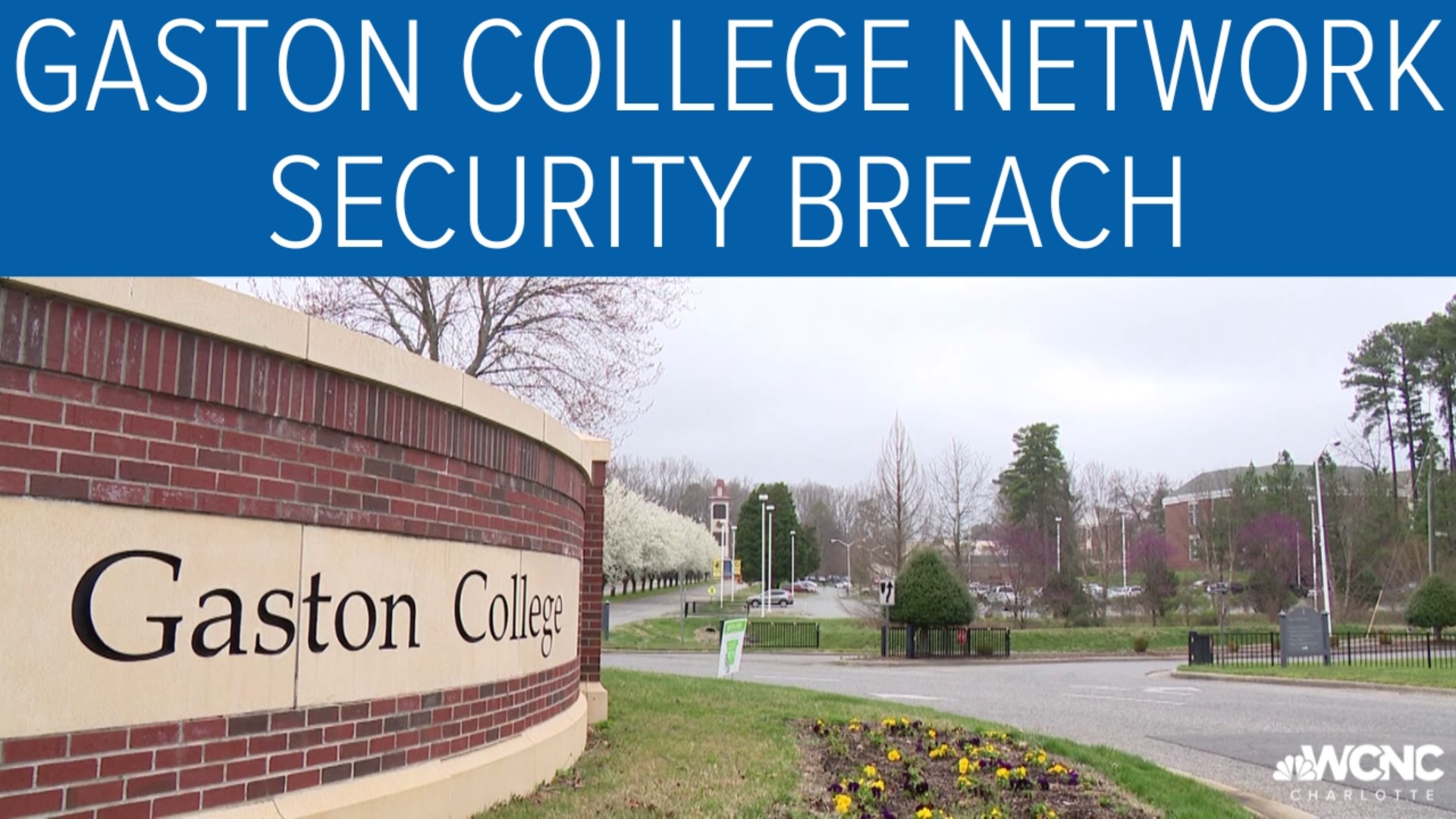GASTONIA, N.C. — Gaston College took its critical systems offline after officials discovered a serious network security issue, the school announced Sunday.
Gaston College said in a statement that it was the victim of a ransomware attack by an "unknown threat actor." The school said it took immediate action once it discovered the threat.
Full statement from Gaston College:
In accordance with North Carolina law governing state agencies, Gaston College did not engage with the threat actor and promptly involved agency partners – including the FBI, Secret Service, North Carolina Community College Systems Office, and the North Carolina Joint Cybersecurity Task Force – to secure possibly affected systems.
With the help of these agencies and through engagement of additional vendor resources, the college’s goal is to fully restore systems in the coming weeks. We appreciate your continued patience as our staff and others work tirelessly to assess and restore affected systems.
As we navigate our response to this attack, the security of our students, faculty, and staff remains Gaston College’s top focus. As such, we will continue work through next week’s spring break in our ongoing effort to bring College systems online safely.
Additional interruptions to our services may be experienced as we continue to assess impacted systems. We ask for your continued patience as we continue addressing the impacts of this attack.
On-campus operations and classes continued Monday with alternative links for student and employee access to certain programs, including Microsoft Office and Blackboard. Email, phones and self-service systems may be impacted by the network security issue.
"Additional interruptions to our services may be experienced in the coming days," Gaston College's news release said. "We ask for your continued patience as we work with our partners to assess and restore our systems."
Gaston College denied WCNC Charlotte's request for an interview on the system interruptions. Students on campus reported being asked to use WIFI hotspots, and their teachers being told not to turn on certain desktops.
A spokesperson did not directly answer WCNC's questions regarding these issues, but in a statement addressed any interruptions with WiFi.
"The administration at Gaston College has not issued a directive related to the use of WiFi on campus," a spokesperson said in an emailed statement. "Interruptions to our services, including campus WiFi, may be experienced as we work with our partners to assess and restore systems."
Ongoing threats to cyber security
Following this attack on the school, experts say outside attacks on education systems are on the rise.
"If you think about education, whether it's higher-ed or K-12 a lot of these school systems have information on their students, you know, which can be valuable to bad actors," Ed Carroll, a veteran in the cyber security field and the Carolina Cyber Center's Senior Director of Corporate Engagement.
One report shows ransomware, a malicious software designed to block access to a computer system until a sum of money is paid, hit 954 schools and colleges in 2021. This potentially impacted over 950,000 students. The cost estimate for the attacks was more than $3.5 billion in downtime alone.
Carroll said money is not the only motivator to attack a school system.
"Even if they're not paying a ransom, even if they don't have to pay the ransom to get access back," Caroll said. "It's going to cost money because it takes hours for folks to be working to get him back up to normal."
The Carolina Cyber Center is working to train people to stop the ongoing threat of cyber security threats.
"There's some data that suggests that every 11 seconds now a ransomware attack is taking place on an organization, it used to be around 30 to 39 seconds," Caroll said.
In the Charlotte area alone we’ve seen ransomware cyber attacks on law enforcement, county and city governments, and school districts.
However, experts say it could happen to any business or person.
"It's our favorite restaurant, it's our favorite coffee shops, it's our doctor's offices, our dentist's offices that are being impacted and they're only going to continuously be impacted for the next several years," Carroll said. "It's not slowing down."
Carroll said the growing landscape for jobs in cybersecurity is on the rise.
"We in the state of North Carolina alone have around 20,000 unfilled cyber jobs," Carroll said.
Cybersecurity experts, also known as information security analysts, make a median annual wage of around $102,600 according to the U.S. Bureau of Labor.
The job doesn't require a college degree.
Carolina Cyber Center has a virtual academy program that takes nine months to a year for certification in the field and preparation for a job in cybersecurity.
"We need folks in programs we need folks to kind of join, join up and help us protect against what's going to impact our community," Caroll said.
Contact Shamarria Morrison at smorrison@wcnc.com and follow her on Facebook, Twitter and Instagram.
Wake Up Charlotte To Go is a daily news and weather podcast you can listen to so you can start your day with the team at Wake Up Charlotte.
SUBSCRIBE: Apple Podcasts || Spotify || Stitcher || TuneIn || Google Podcasts
Flashpoint is a weekly in-depth look at politics in Charlotte, North Carolina, South Carolina, and beyond with host Ben Thompson. Listen to the podcast weekly.
SUBSCRIBE: Apple Podcasts || Spotify || Stitcher || Google Podcasts
All of WCNC Charlotte's podcasts are free and available for both streaming and download. You can listen now on Android, iPhone, Amazon, and other internet-connected devices. Join us from North Carolina, South Carolina, or on the go anywhere.

